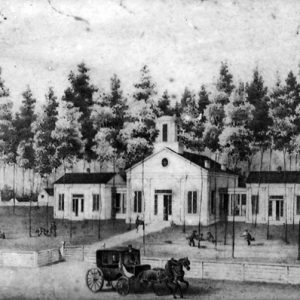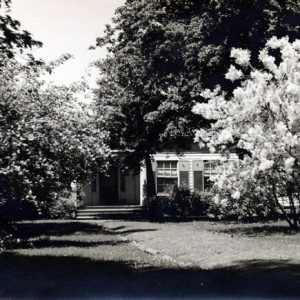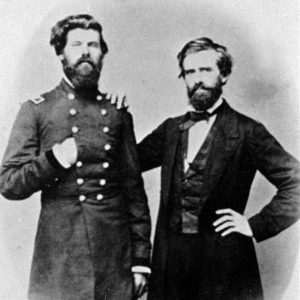calsfoundation@cals.org
Jonas March Tebbetts (1820–1913)
Jonas March Tebbetts of Fayetteville (Washington County) was a prominent lawyer, judge, and politician known for his abhorrence of slavery and support for the Union during the Civil War. His aid to Union forces led to his later arrest by Confederates, who condemned him to death. But fortuitous circumstances led to his freedom, and he lived a long life.
Jonas M. Tebbetts was born on January 5, 1820, in Rochester, New Hampshire, one of five sons of Enoch Tebbetts and Anne Roberts Tebbetts. Tebbetts attended Phillips Exeter Academy in Exeter, New Hampshire. At sixteen, he was working as a marketing agent selling copies of The Family Expositor by English religious nonconformist Philip Doddridge. As a salesman, he traveled throughout New England, Pennsylvania, Ohio, and Kentucky. In 1838, he enrolled as a student at Western University in Pittsburgh, Pennsylvania, but his knowledge in various subjects resulted in his becoming an instructor of English, ancient history, and Greek and Latin languages. He also worked as a reporter for the Pittsburgh Gazette. Afterward, he took a job on a steamboat on the Mississippi and Arkansas rivers.
On a trip to Van Buren (Crawford County), he met Judge George W. Paschall. The judge prepared him for the Arkansas bar exam, and Tebbetts established a law practice in Van Buren. He represented Cherokee, Choctaw, and Crow living in Indian Territory (present-day Oklahoma). In Van Buren, he was elected judge. A Democrat, he was elected prosecuting attorney of the Seventh Circuit Court of Arkansas in 1844. Despite subsequent service in other offices, he apparently remained in this position until Arkansas seceded from the Union.
As prosecuting attorney, Tebbetts traveled to Washington County, where he met Matilda Winlock, a student at Fayetteville Female Seminary. They married in 1847; they had several children. The couple took up residence in Fayetteville, building the famous Headquarters House in 1853 and 1854.
Tebbetts served as clerk of the Arkansas General Assembly in 1846 and from 1848 to 1849. In 1847, he attended a revival held by followers of Alexander Campbell, leader of the Christian Church (Disciples of Christ), and then converted. A Christian Church was then established in Fayetteville with Robert Graham as pastor. The church became influential in Fayetteville, where it founded Arkansas College in 1850. Tebbetts formed a lasting friendship with Graham and William Baxter, president of Arkansas College, both of whom also abhorred slavery.
Elected to the Arkansas General Assembly as the representative for Washington County, he served from November 1850 to January 1851, earning a reputation as a pro-Union, antislavery Democrat. In 1856, he attended the state Democratic convention in Batesville (Independence County), supporting Congressman Alfred Burton Greenwood of Benton County against Thomas Carmichael Hindman of Helena (Phillips County), an outspoken defender of slavery.
Arkansas seceded from the Union in May 1861, with Fayetteville under Confederate control. Union forces under General Alexander Asboth entered the town on February 23, 1862. Tebbetts volunteered his home as headquarters for the Union troops and presented the general with a flag to fly above the house. But on February 26, the Union forces withdrew from Fayetteville, and Confederate forces under General Benjamin McCulloch returned. The general had Tebbetts arrested for supporting the Union army and sentenced to death. But during the Battle of Pea Ridge on March 7, 1862, a sharpshooter’s bullet killed McCulloch. With McCulloch dead, Tebbetts was released from the prison in Fort Smith (Sebastian County). He fled to Missouri, where he spent the remainder of the war.
After the war, Tebbetts lobbied for former Confederates seeking pardons. In 1866, he made an abortive campaign for U.S. Senate. However, the continued hostility of Confederate loyalists led Tebbetts and his family to leave Arkansas for good. Relocating to Harrodsburg, Kentucky, he resumed his law practice. In 1871, he served as mail agent for Arkansas. His wife died in 1892, and Tebbetts moved to Pittsburgh, Pennsylvania, to live with his daughter Lillian and her husband, John H. Galey. Galey was a petroleum wildcatter with claims in Pennsylvania, Kansas, and Texas.
Tebbetts died on January 16, 1913, and is buried beside his wife in Harrodsburg.
For additional information:
Baxter, William. Pea Ridge and Prairie Grove, or, Scenes and Incidents in the War in Arkansas. Fayetteville: University of Arkansas Press, 2000.
Campbell, William S. One Hundred Years of Fayetteville, 1828–1928: The Journal of Marian Tebbetts Banes. Fayetteville, AR: Washington County Historical Society, 1977.
Jonas M. Tebbetts Collection. Special Collections. University of Arkansas Libraries, Fayetteville, Arkansas.
Todd E. Lewis
University of Arkansas, Fayetteville
 Arkansas College
Arkansas College  Tebbetts House
Tebbetts House  Jonas Tebbetts
Jonas Tebbetts 




Comments
No comments on this entry yet.